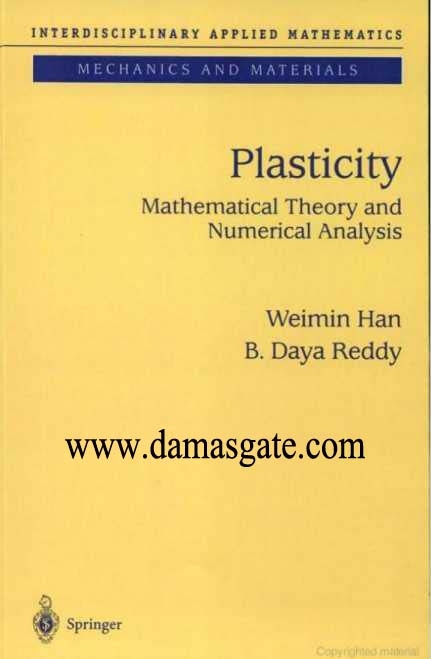Plasticity - Mathematical Theory and Numerical Analysis Interdisciplinary Applied Mathematics

Weimin Han B. Daya Reddy
Plasticity
Mathematical Theory and
Numerical Analysis
With 34 Illustrations
Preface
The basis for the modern theory of elastoplasticity was laid in the nineteenthcentury,
by Tresca, St. Venant, L
´
evy, and Bauschinger. Further
major advances followed in the early part of this century, the chief contributors
during this period being Prandtl, von Mises, and Reuss. This
early phase in the history of elastoplasticity was characterized by the introduction
and development of the concepts of irreversible behavior, yield
criteria, hardening and perfect plasticity, and of rate or incremental constitutive
equations for the plastic strain.
Greater clarity in the mathematical framework for elastoplasticity theory
came with the contributions of Prager, Drucker, and Hill, during the
period just after the Second World War. Convexity of yield surfaces, and
all its ramifications, was a central theme in this phase of the development
of the theory.
The mathematical community, meanwhile, witnessed a burst of progress
in the theory of partial differential equations and variational inequalities
from the early 1960s onwards. The timing of this set of developments was
particularly fortuitous for plasticity, given the fairly mature state of the
subject, and the realization that the natural framework for the study of
initial boundary value problems in elastoplasticity was that of variational
inequalities. This confluence of subjects emanating from mechanics and
mathematics resulted in yet further theoretical developments, the outstanding
examples being the articles by Moreau, and the monographs
by Duvaut and J.-L. Lions, and Temam. In this manner the stage was
set for comprehensive investigations of the well-posedness of problems in
elastoplasticity,
Download
*